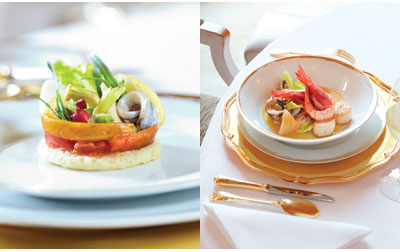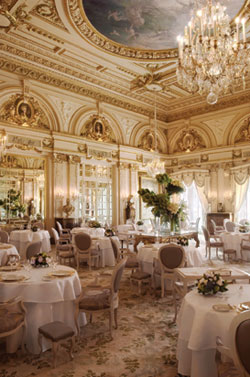The Caterer and Hotelkeeper Interview – Alain Ducasse
On 17 November, 250 chefs from around the world, with nearly 300 Michelin stars between them, will gather for dinner at Le Louis XV, Hotel de Paris, Monaco, to celebrate 25 years of three Michelin stars. Fiona Sims talks to its legendary chef-patron Alain Ducasse, and finds out what he'll be cooking on the night
Tell us more about the 25th anniversary menu at Le Louis XV, available to diners until the end of November - and what will you be cooking for the chefs?
It's a celebration of our 25-year focus on local products from artisanal Mediterranean producers, from vegetables to fish, from the simplest presentation to the most sophisticated. It's about what I have to cook with and what knowledge I have to cook it, and about preserving the original flavour of each ingredient.
The idea is nothing new. We started doing this 25 years ago, but there is much greater attention to this kind of eating nowadays. It's a taste of the Mediterranean. Riviera cuisine is simple and modest - it's about the sun and the sea and I've built my cuisine at Le Louis XV around that.
The anniversary menu is not about bringing back specific dishes; it's an expression of the moment. For the celebration day on 17 November there will be a market showcasing 100 different local products, and for the dinner I will create five or six very simple dishes to keep the essence of those products, so really this will be the opposite of sophisticated - it will be very rough and pure.
Vegetables have become a real focus on your menus - tell us why
I first introduced a vegetable menu 25 years ago, in 1987. But yes, there is more of a focus on vegetables now. I have five cooks in my kitchen at Le Louis XV working solely on vegetables - that's how seriously we take it, and there's such a rich source locally. It requires a lot of time and attention when creating a dish with just vegetables, especially if it's a main course.
You've watched culinary trends come and go over the last four decades - how do you keep evolving?
I never follow trends. I travel all over the world and eat everywhere, not so I can copy trends, but so I can do my own thing. It's better to create a trend than to follow one. For me, that's not hard. It's about what I want to do at that moment; it's about what is around me, and what's available. There is a focus now on healthier ways of cooking, but I don't see that as a trend; it's a way of life.
How do you maintain standards across your business? What's the secret?
It's about control and great attention to detail, and having long time collaborators who have worked with me for 25 years or more and being able to share my vision and convince them to go along with it. Franck Cerruti at Le Louis XV has worked with me for 33 years; Jocelyn Herland in London has been with me for 13 years. All the chefs train at either Monaco or Paris and they share something in common, which you'll find in their cuisine like DNA. They learn how to prepare local produce, cook it perfectly, and season it in just the right way - it's very pure and easy to understand for diners.
You've opened a cookery school and chic country hotels, plus a posh take-away - what is there left to do?
I'm just about to publish a cookbook for babies, and I've worked on menus for the elderly. And yes, I've done the schools thing - it's so important to change young people's mindsets. One of my obsessions is to share my knowledge with the largest number of people, which is why we created Ducasse Education; it offers all kinds of consulting, including advice on healthy cuisine. What am I most proud of? It's tomorrow that counts, not the past - though it is good to go back sometimes.
When you took over Le Louis XV, you agreed to a contract that stated that if you did not win three Michelin stars in four years you would be fired - and you did it in three years. Did you ever have any self-doubt along the way?
Every day. It's the engine. If I was 100% sure about things then I wouldn't move forward. Self-doubt is what makes everyone improve themselves. The day you are too certain about things is the day you go backwards. You have to accept the risk that you will make mistakes when you are exploring new territories - and I've made mistakes. How many? Probably 10% of the time, but you need to make mistakes to get it right.
Who has been influential on your career?
All the chefs I've worked with have given me something, and helped me to build my knowledge. Alain Chapel taught me to taste and gave me the desire to select the best of the best. Michel Guérard was about creativity, while Gaston Lenôtre taught me pastry. It was Roger Vergé who passed on his passion for Mediterranean flavours, which I developed further in Monaco. I use what is available and combine that with this knowledge. What I have, what I know and what I do - that sums it up.
Who do you admire today?
In the UK, among them Gordon Ramsay - he put the UK on the culinary map globally, but in each country there are leaders like this, which help put their country in the spotlight. The stars of tomorrow? Dan Barber at Blue Hill at Stone Barns in New York is certainly one of them. But you can find tomorrow's heroes everywhere in the world now.
It's different these days - chefs now tell their own stories, that's what makes them stand out, and Gordon is a good example of that. He acquired his technique in France and applied a British taste - just like Gaultiero Marchesi did in Italy, and Paul Bocuse in Lyon, and Wolfgang Puck, Thomas Keller and Michael White in the USA - they are all leaders. There is no number one.
Who or what is your biggest inspiration?
The market. There are so many I love, from Florence to Nice, Barcelona to Union Square, New York, but my favourite is in Kyoto, Japan. It has the largest variety of products that I've ever seen anywhere in the world - half a kilometer long with over 250 stalls. I always leave Japan feeling slightly depressed.
What are your views on restaurant chefs appearing on television?
It's good for the industry - it promotes the industry. The more we see chefs appearing on television, the more people will talk about it - and that's better for us. I'm glad that there is so much interest in the profession these days. It's not by chance that Gordon has become the television star he has - and he's good at it.
Which one core value do you feel chefs most need to learn and master?
Knowledge of a product. You need to spend time talking with producers and understand how they do it, and then learn how to prepare that product in the perfect way.
And once you have found those producers you need to enable them to make a decent living out of it, to preserve their craftsmanship, so you must pay them well. It's like mastering a musical instrument - you need to learn the technique first. If you cook without these basics then it could work, but it won't work all the time.
ALAIN DUCASSE IN A NUTSHELL
Alain Ducasse is one of the world's most decorated chefs, currently at the helm of three restaurants with three Michelin stars, in London, Paris and Monaco. He has trained many now well-known chefs, from Elena Arzak to Massimo Bottura.
Born in 1956 on a farm in south west France, Ducasse developed his taste for local ingredients, such as mushrooms and foie gras, and started working in the kitchen at the age of 16. In the years that followed he worked for various famous chefs and restaurants including Michel Guérard, Roger Vergé and Alain Chapel.
It was at La Terrasse at the Hotel Juana in Juan-Les-Pins that Ducasse was awarded two Michelin stars, moving to the Le Louis XV at the Hotel de Paris in Monaco in 1987. At the age of 33, he won three Michelin stars, a first for a hotel restaurant.
His business since then has been meteoric and he has been showered with many more stars, from country inns in Provence to a training centre for professionals, Ducasse Education, plus a cookery school for non-professionals. His latest venture is Mix in St Petersburg, which is a collaboration between Ducasse and the Clinton Global Initiative.
LE LOUIS XV 25TH ANNIVERSARY MENU
â- San Remo Gamberoni, delicate rock fish gelée, caviar
â- Risotto of mountain cepes, dried and finely shaved
â- Mediterranean sea bass, lemon confit, roasted fennel, red pepper and onions
â- Duck breast with figs, apple crisps and pommes soufflées
â- Selection of regional goat's cheese
â- Wild strawberries and a mascarpone sorbet
â- Warm Piedmont hazelnut soufflé
â- After dinner sweets and chocolates by Alain Ducasse
The anniversary menu is available until December at €280
â- Alain Ducasse restaurants around the globe are celebrating Le Louis XV 25th anniversary by creating one Riviera-inspired dish each for their menus this year. At Alain Ducasse at the Dorchester in London, executive chef Jocelyn Herland has put on roasted sea bass with artichoke poivrade and palets d'ail doux.









